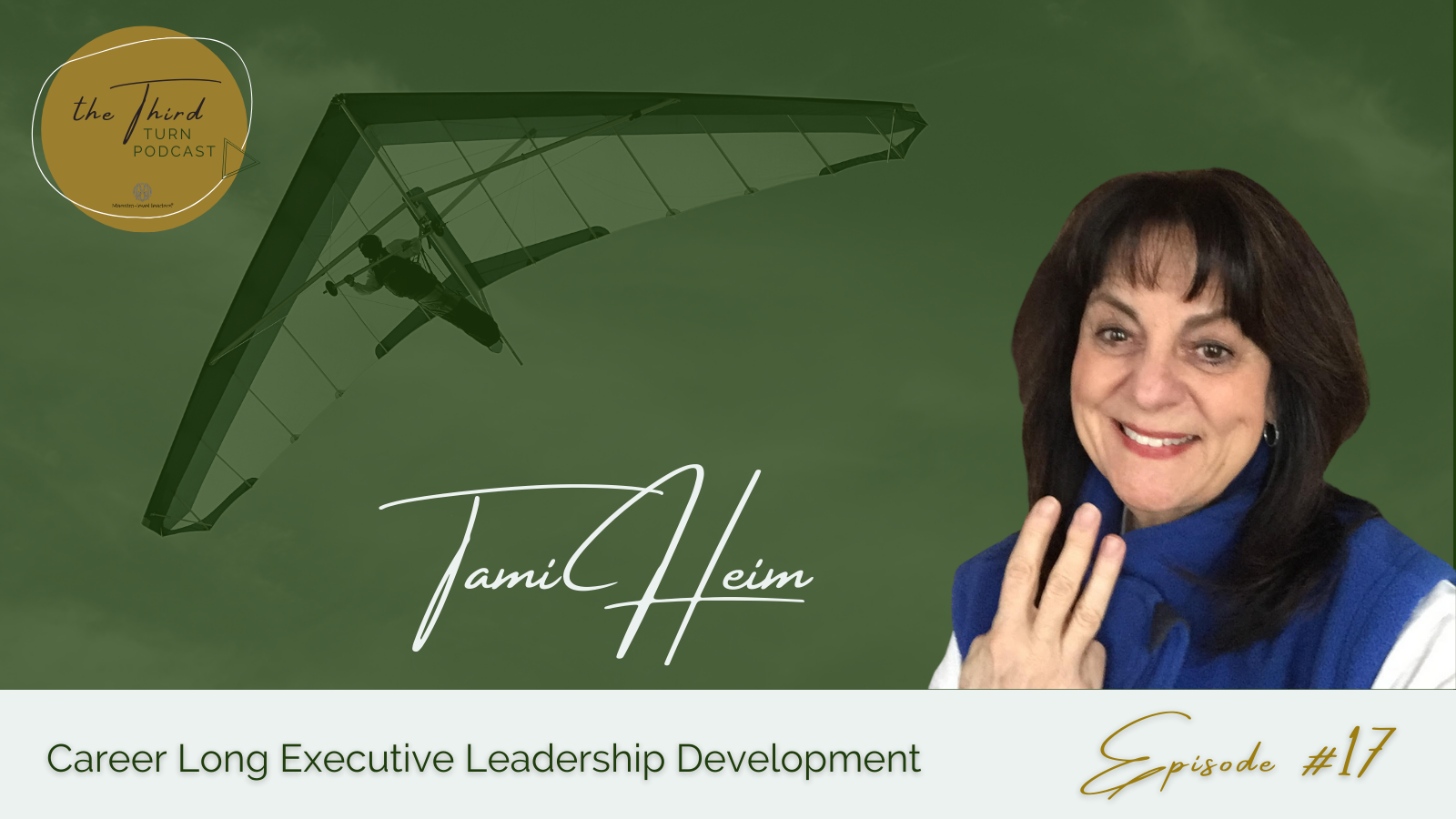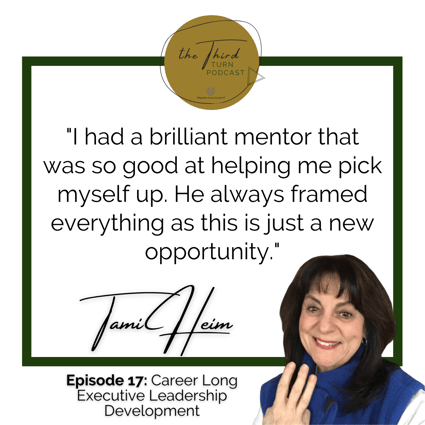
Or Listen on your Favorite Platform:
Career Long Executive Leadership Development
Episode #17 of the Third Turn Podcast - A Conversation with Tami Heim
In this episode of the Third Turn Podcast, my cohost Kristin Evenson and I interview CLA's own Tami Heim as she discussed her own lifelong learning through the Three Turns of Executive Leadership Development. Two phrases stood out.
Consciously incompetent
Unconsciously competent
The first phrase ties strongly to the first Two Turns of executive leadership where the leader learns to lead where their self is concerned, and then to lead an organization and the people associated with it. This Executive Leader must cultivate deep awareness that they don't know and do it in such a way that it trumps their desire for a closed and repeatable certainty. If they do not become skilled as a steward of their incompetence, they end up not being an effective steward leader.
The second phrase intertwines with the Third Turn, as that executive leader develops future value and organizational competencies that someone else will lead beyond their tenure. This era of their leadership invites them to bring competencies to the front they may not have previously emphasized or may not know they have. They must learn to trust that these competencies serve them even if they feel awkward and even as that Executive Leader continues to learn along with those they serve.
Here is an example of these two phrases in play with each other: Let's draw on the example of the Executive Leader's voice. At first, a young and emerging leader may speak too much, or offer insight too readily, unaware that their idea does not actually match the context they wish to influence. They quote from a graduate school textbook, for instance, making a statement rather than asking a question. They say, "Well, my professor said massive concentration of resources wins you market share," rather than asking "Does the principle of concentrating resources to win market share have any bearing here?" The new leader does not surrender what they know in either case, but curiosity keeps them open to learn even more, in real time and in real life. Further down the road, a more seasoned leader might draw too readily on their past successes to drive organizational strategy. Instead of quoting from a textbook they tells stories of their triumphs and certifications. Once again, they need to channel what they know into questions that seeks to know more: from mentors, peers, colleagues, employees, competitors, subject matter experts and even different marketplaces. In either of these Two Turns the Executive Leader must come to grips with and make good use of their incompetence.

Later, that seasoned leader might not recognize the authority and strength of their voice. They may be unaware that speaking or failure to speak carries ripples and weight that helps or harms the cause. If they have led successfully a certain gravitas accumulates they might now know they have. They think they are whispering yet everyone seems to hear it as a shout. Perhaps they might not realize that their replay of the history of a decision shuts down needed innovation, or conversely, that their failure to replay the history of a decision hurtles the organization toward ignorant and preventable mistakes. This is a time for deep experience to provide contextual insight, to produce a light yet firm touch in the important places, and to drive the intentional shaping of others for their own steward leadership. The alert and learning Third Turn Leader can draw all of their competencies into a new and valuable combination for future missional success.
And here I would like to add a third phrase I've been making use of lately:
Liminal space as permanent residence.
When the pandemic broke so wide open, liminal space became common parlance, a means to deal with the spiritual and existential devastation quarantine, economic uncertainty, and disease/death were bringing. The upshot of the many articles written on the subject touched on liminal space--the times of glimmering light just before sunrise or just after sunset--as a time that will pass, a time to re-examine and be prepared for what will follow, and a time to leave behind just as soon as the light shines more brightly.
While I appreciated the sentiment and can understand the importance of seizing opportunities to reflect, I'd like to suggest that, actually, we live in twilight all the time. We are always becoming. We live suspended between past and future and can only truly inhabit the fleeting now. The more we think we know the more we will discover that we don't know. And the more we know that we don't know the more we have opportunity to rejoice that there is a greater and even more transformative moment beyond anything we can see, even now, even after all these years of loving and serving and hoping.
I've long-loved a wonderful way of saying this. My heart sings when I hear it repeated elsewhere because it calls to the deepest part of my soul that longs for a better world for those who will follow after:
I live in the now, not the not yet; but the not yet is in my heart now.
Tami Heim is one of those persons who lives with this sentiment in the deepest part of her soul. It shows in the way she serves as a Maestro-level leader.
If you wish to know more about Christian Leadership Alliance, you can spend time with the following websites. Perhaps I'll see you at the next Outcomes Conference, this summer in Orlando. Here is to herd immunity!
www.ChristianLeadershipAlliance.org
www.OutcomesConference.org


- Mark
The Third Turn Podcast is part of the Maestro-level leaders initiative, a production of Design Group International. Strategically Connected's Jennifer Miller is the producer.
The Third Turn Podcast is available on CLATV.
Discover more about The Third Turn Podcast:
Tags:
Design Group International, leadership legacy, Maestro-level Leaders, The Third Turn, The Third Turn Podcast, Tami Heim, CLA, Christian Leadership Alliance, Consciously incompetent, Unconsciously competent
March 30, 2021
Comments